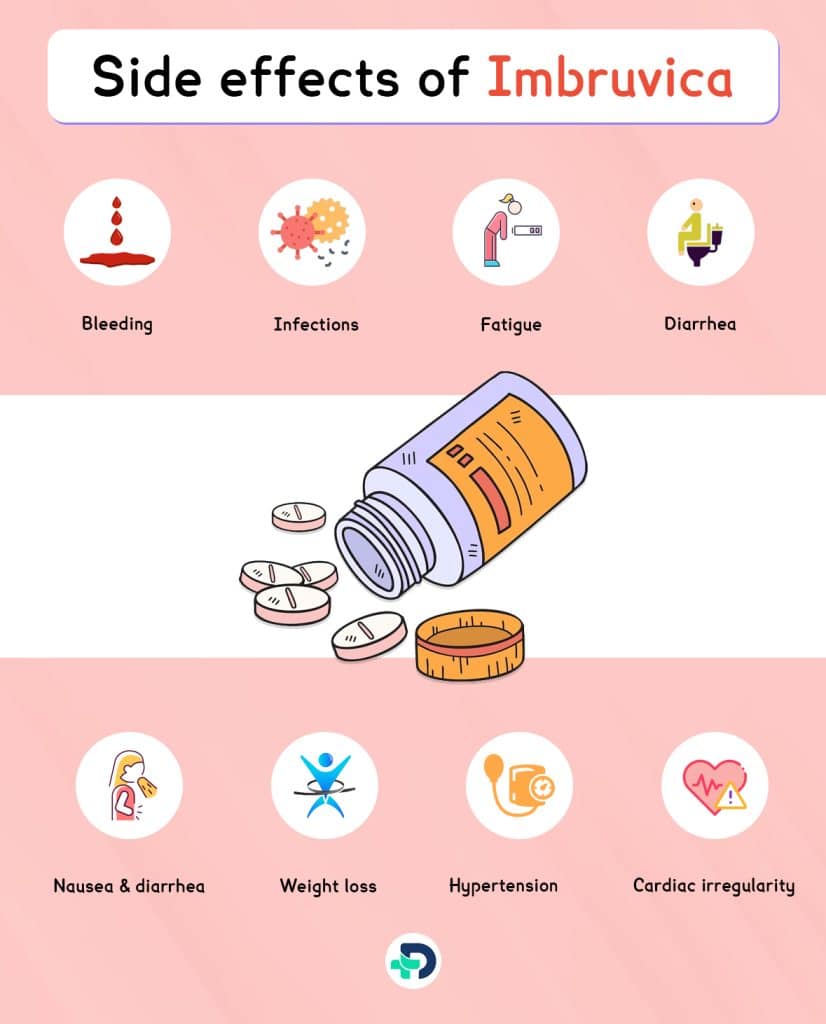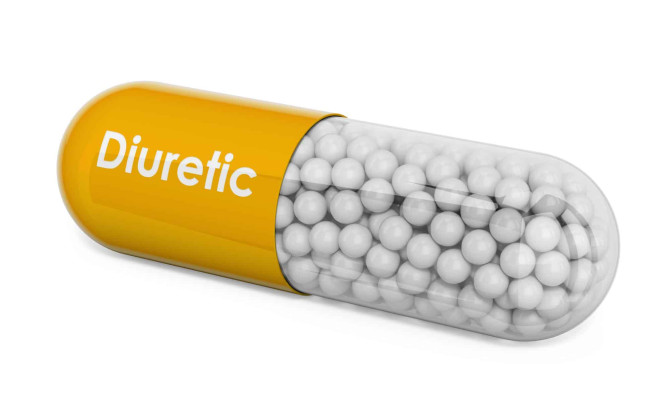Imbruvica: Uses, Side effects and Precautions

- Imbruvica
- 22 Aug 2023
Overview
What is Imbruvica?
Imbruvica, or ibrutinib, is a ground-breaking pharmaceutical in targeted cancer therapy. It is a member of the oral kinase inhibitor drug family and is licensed to treat severe hematological malignancies.
This article explores the incredible journey of imbruvica, illuminating its mode of action, indications, clinical studies, and its profound effect on patients’ lives.

Uses
Uses of Imbruvica
This flexible medication has been given the go-ahead to treat several hematological cancers. Its critical therapeutic applications target particular cancers and destroy their growth and survival mechanisms.
Imbruvica commonly prescribed in following conditions:
- Mantle cell lymphoma treatment
- Management of Chronic lymphocytic leukemia
- Treatment of a small lymphocytic lymphoma
- Management of Waldenstrom macroglobulinemia
- Treatment of Lymphoma in the marginal zone
- In the treatment of Graft vs. host illness that is persistent
Mantle cell lymphoma
- It has been given the go-ahead to treat brain cell lymphoma, a non-Hodgkin’s lymphoma that commonly involves the spleen, lymph nodes, and bone marrow. It is frequently administered as the first line of defense for patients with at least one prior therapy.
Chronic lymphocytic leukemia
- The most typical kind of adult leukemia, chronic lymphocytic leukemia, can be treated with it. It is applied to patients with relapsed or resistant disease and is a first-line treatment.
A small lymphocytic lymphoma
- SLL is also approved for treating small lymphocytic lymphoma since it has many traits with CLL.
Waldenstrom macroglobulinemia
- The rare non-Hodgkin’s lymphoma Waldenstrom macroglobulinemia, characterized by the presence of an aberrant protein (immunoglobulin M) in the blood, is approved for therapy with it.
Lymphoma in the marginal zone
- It has been given the go-ahead in various nations to treat marginal zone lymphoma, a subtype of B cell lymphoma that develops from the lymphoid tissue’s marginal zone.
Graft vs. host illness that is persistent
- It has been approved to treat chronic graft versus host disease, a problem that can happen following allogeneic stem cell transplantation and its usage in hematologic malignancies.1Uses| Researched based study from Fda.gov ,2Uses| Researched based study from Nlm.nih.gov
Side effects

Imbruvica side effects
Although it is a precious and effective medicine for treating specific hematologic malignancies, it can also have some adverse effects. These are not always present in patients, and their severity varies from person to person. Patients must be informed of possible side effects and express worries to their healthcare professionals. Among the frequent negative consequences are the following:
Bleeding
- It may impact platelet function, raising the possibility of bleeding. Bruising, nosebleeds, bleeding gums, and protracted bleeding from cuts or accidents are all common in patients.
Infections
- It could weaken the body’s defenses against infections and make current ones worse.
Fatigue
- Weakness and fatigue are frequent side effects of Ibrutinib therapy. Patients can feel less energized and more exhausted than usual.
Diarrhea
- It is yet another typical adverse effect that, if ignored, might result in dehydration.
Nausea and diarrhea
- During therapy, some patients may feel sick to their stomach and vomit.
Weight loss
- It may decrease appetite, which in some people might result in weight reduction.
Joint and muscle aches
- Muscle and joint discomfort, which can range in intensity from mild to moderate, may be experienced by patients.
- Itching and skin rashes are potential side effects.
Hypertension
- Some patients’ blood pressure may rise as a result.
Cardiac irregularity
- Rarely, it could cause an irregular heartbeat.
It’s crucial to remember that not every patient will suffer from these, and some patients might only encounter minor ones. Additionally, healthcare professionals can control and lessen side effects using various methods, like dose modifications or supporting drugs.1Side effects| Researched based study from Fda.gov
Drug interactions
Drug Interactions
It is a potent drug that may interact with others, reducing its effectiveness or increasing the risk of adverse side effects. Patients and healthcare professionals must be aware of these to provide safe and effective care.
Strong inhibitors of CYP3A
- The CYP3A enzyme in the liver is principally responsible for its metabolism. Ketoconazole, itraconazole, clarithromycin, and grapefruit juice are potent CYP3A inhibitors that can drastically raise the blood level of a medicine, increasing the risk of side effects.
- In cases where CYP3A inhibitors are also taken, the dosage may need to be changed by healthcare professionals.
Strong inducers of CYP3A
- Strong CYP3A inducers, on the other hand, such as rifampin, carbamazepine, and St. John’s Wort, can lower the blood levels of the medicine, potentially reducing its effectiveness. Alternative therapies or avoiding co-administration should be taken into account.
Antiplatelet and anticoagulant medications
- Due to its impact on platelet function, it can raise the risk of bleeding. The bleeding risk may increase when coupled with anticoagulant medications like warfarin or antiplatelet drugs like aspirin and clopidogrel. It is crucial to monitor patients who are taking it closely.
Vaccines
- Because there is a chance that the treatment will reduce the vaccine’s effectiveness, live vaccines should be avoided. They should speak with their medical professionals to get the proper immunization advice.
Substrate for CYP3A
- It might affect how substrate medicines are metabolized. In some circumstances, this could lead to higher or lower blood levels of these medications, possibly changing their efficacy or safety profiles. For some drugs, a dose modification may be necessary.1Drug interactions| Researched based study from Fda.gov ,3Drug interactions| Researched based study from Nlm.nih.gov
Precautions
Warnings and precautions
Allergic responses
- The patient should disclose any allergies to their healthcare provider. A severe allergic reaction to the medication may necessitate rapid medical intervention.
Bleeding risk
- It may impact platelet function, raising the possibility of bleeding. Patients should disclose if they have a history of bleeding disorders or are using anticoagulants or antiplatelet medications that may enhance their risk of bleeding.
Infections
- It might make the body less able to fend off infections. Any indicators of a disease, such as a fever, chills, sore throat, or cough, should be reported immediately to your doctor.
Functional liver and kidney
- The liver is principally responsible for metabolism; the kidneys handle its elimination. During treatment, dosage changes or strict monitoring may be necessary for patients with compromised liver or renal function.
Heart-related effects
- Both hypertension and cardiac arrhythmia may result from it. Cardiovascular history patients should be closely watched during treatment.
Pregnancy and breastfeeding
- It shouldn’t be used during pregnancy unless the possible advantages outweigh the risks because it can harm the unborn child. Women of reproductive age should utilize an effective form of contraception when receiving treatment and for a set amount of time after stopping the medication. During the course, breastfeeding should be avoided.
Medications
- Before beginning treatment, patients should give their doctor a thorough inventory of all the drugs, vitamins, and herbal medicines they take. This covers recent vaccines as well as prescription, over-the-counter, and alternative medications.
Live vaccinations
- The efficacy of live immunizations might be compromised.1Precautions| Researched based study from Fda.gov ,3Precautions| Researched based study from Nlm.nih.gov
Bottom Line
The bottom line
Ibrutinib (Imbruvica) is a game-changing and revolutionary medication in targeted cancer therapy. It has demonstrated outstanding clinical effectiveness and a good safety profile. However, it does have possible adverse effects and drug interactions, just like any vital medication, which calls for careful monitoring and close cooperation between patients and healthcare professionals.
Any feedback on this article?
 This Articles content was accurate
This Articles content was accurate Very Informative Article
Very Informative Article I have a question or a comment
I have a question or a comment
 This article contains inaccurate content
This article contains inaccurate content This article was not helpful
This article was not helpful I have a question or a comment
I have a question or a comment
We appreciate your helpful feedback!
Checkout our social pages
References
-
FOOD AND DRUG ADMINISTRATION
IMBRUVICA | Uses | Side effects | Adverse reactions | Drug interactions | Precautions
-
National Library of Medicine
Ibrutinib | Uses
-
National Library of Medicine
Ibrutinib (Imbruvica): A Novel Targeted Therapy for Chronic Lymphocytic Leukemia | Precautions





































